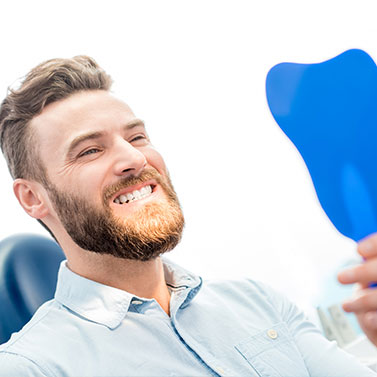TMJ-TMD
Bruxism
Teeth grinding, or bruxism, refers to excessive grinding of the teeth and/or excessive clenching of the jaw, usually occurring when one sleeps. If you wake up with jaw pain, tension headaches, or facial pain, you may be suffering from bruxism. Some people aren’t even aware they are grinding or clenching their teeth at night, until a visit to us reveals significant tooth enamel loss or damage to restorations.
Tension, stress, and anxiety experienced during the daytime can carry over to an individual’s sleep, and lead the person to grind his or her teeth together or clench the teeth unknowingly. Regardless of the cause, however, frequent clenching and grinding wears down the chewing surfaces of the teeth, reduces tooth enamel, and can result in a cracked or chipped tooth, crown, or filling.
Treatment Options
Fortunately, there is a non-invasive and effective solution for teeth grinding, and the tooth enamel damage it can cause, in custom-fabricated nightguards. Nightguards are created through a non-invasive process that includes taking an impression of the bottom and top rows of teeth. The result is a nightguard that is flexible, comfortable, and personalized to your mouth.
Although it’s important to wear your nightguard faithfully if you grind your teeth at night, you can also follow a few self-care tips to help to prevent your teeth grinding from worsening.
- Reduce tension and stress. Whether you take a warm bath before bed, listen to soothing music, or exercise, practicing stress-relieving activities can help alleviate stress and tension.
- Avoid alcohol and caffeine. In some patients, alcohol and caffeine can increase teeth-grinding tendencies.
- Focus on relaxing jaw muscles. Make a conscious effort to keep your jaw relaxed. A warm washcloth against your cheek, sticking your tongue between your teeth, and avoiding chewing pencils, pens, and gum are all ways to train the muscles of your jaw to stay relaxed. Remember: lips together, teeth apart!
Because you may have bruxism and be unaware of it until complications develop, it's important to know the signs and symptoms of bruxism and to seek regular dental care. If you suspect that bruxism is the cause for your headaches or jaw pain, please contact our office and schedule an appointment.
Nightguards
If you often wake up with jaw pain, earaches, or headaches, or if you find yourself clenching or grinding your teeth, you may have a common condition called bruxism.
Although the causes of bruxism are not really known, several factors may be involved. Stressful situations at home, school, or work, problems in sleeping, an abnormal bite, and crooked or missing teeth may contribute to bruxism. Many people do not even know that they grind their teeth, as it often occurs when one is sleeping. If not corrected, bruxism can lead to broken teeth, cracked teeth, damaged restorations, or even tooth loss.
There is an easy, non-invasive treatment for bruxism: nightguards. Nightguards are an easy way to prevent the wear and damage that teeth-grinding cause over time. Custom-made by your dentist from soft material to fit your teeth, a nightguard is inserted over your top or bottom arch and prevents contact with the opposing teeth.
Choosing the right mouthguard is essential. There are three basic types of mouthguards: the pre-made nightguard, the “boil-and-bite” nightguard, and a custom-made nightguard from our office. When you choose a nightguard, be sure to pick one that is tear-resistant, comfortable and well fitted for your mouth, easy to keep clean, and does not prevent you from breathing properly. A nightguard created in our office will fit all these requirements, as it will be custom-made just for your teeth.


 Website Powered by Sesame 24-7™
Website Powered by Sesame 24-7™